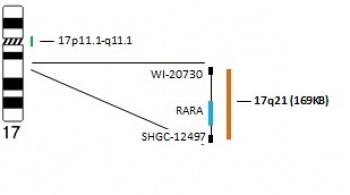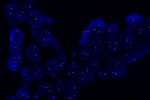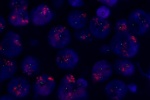LSI RARA (Orange)/CEP17 (Green)
« backProbe location

Probe description
The LSI RARA FISH kit is intended for the determination of RARA gene amplification and/or rearrangement in human tissues using fluorescence in situ hybridization (FISH).
The LSI RARA FISH kit contains two directly labeled fluorescent DNA probes in hybridization buffer. The fluorochrome Orange labeled RARA probe covers the chromosome 17q21 region. The fluorochrome Green labeled chromosome enumeration CEP17 probe covers the chromosome 17p11.1-17q11.1 region.
RARA (Retinoic acid receptor alpha) gene codes for the retinoic acid receptor α which regulates transcription in a ligand-dependent manner. RARA gene is often co-amplified with Her-2/neu and TOP2A genes. It has already been evidenced that alterations in the RARA gene are associated with breast ductal carcinoma in situ (DCIS), positive estrogen receptors and high proliferation.
FISH results
For the differentiation between true amplification of RARA gene and chromosome 17 polyzomy, a mixture of directly labeled probes LSI RARA (Orange) and CEP 17 (Green).
 |
 |
| A | B |
Figure. 1: Assessment of the copy number of RARA gene and chromosome 17 copy number in FFPE tissue (breast cancer patient tissue). ![]() LSI RARA
LSI RARA ![]() CEP17
CEP17
a) 2 copies of RARA gene and 2 copies of chromosome 17
b) 2 copies of chromosome 17, higher copy number of RARA gene (amplification).
Information
|
Name |
Catalogue number |
Packing size |
Prize |
Instruction for use |
|
CEP17 (Green) / LSI RARA (Orange) |
IM_039 |
200μl |
upon request |
References
- Ariga N, Moriya T, Suzuki T, Kimura M, Ohuchi N, Sasano H: Retinoic acid receptor and retinoid X receptor in ductal carcinoma in situ and intraductal proliferative lesions of the human breast. Jpn J Cancer Res 2000; 91(11):1169-76. [fulltext]
- Keith WN, Douglas F, Wishart GC, McCallum HM, George WD, Kaye SB, Brown R: Co-amplification of erbB2, topoisomerase II α and retinoic acid receptor α genes in breast cancer and allelic loss of topoisomerase I on chromosome 20. Eur J Cancer 1993; 29A(10): 1469-1475. [fulltext]
- Keith WN, Tan KB, Brown R: Amplification of the topoisomerase II alpha gene in a non-small cell lung cancer cell line and characterisation of polymorphisms at the human topoisomerase II alpha and beta loci in normal tissue. Genes Chromosomes. Cancer 1992; 4: 169-175. [fulltext]
- Murphy DS, McHardy P, Coutts J, Mallon EA, George WD, Kaye SB, Brown R, Keith WN: Interphase cytogenetic analysis of erbB2 and topoIIα co-amplification in invasive breast cancer and polysomy of chromosome 17 in ductal carcinoma in situ. Int J Cancer 1995; 64: 18-26. [fulltext]
- Jinno H, Steiner MG, Nason-Burchenal K, Osborne MP, Telang NT: Preventive efficacy of receptor class selective retinoids on Her-2/neu oncogene expressing preneoplastic human mammary epithelial cells. Int J Oncol 2002; 21(1): 127-134. [fulltext]


